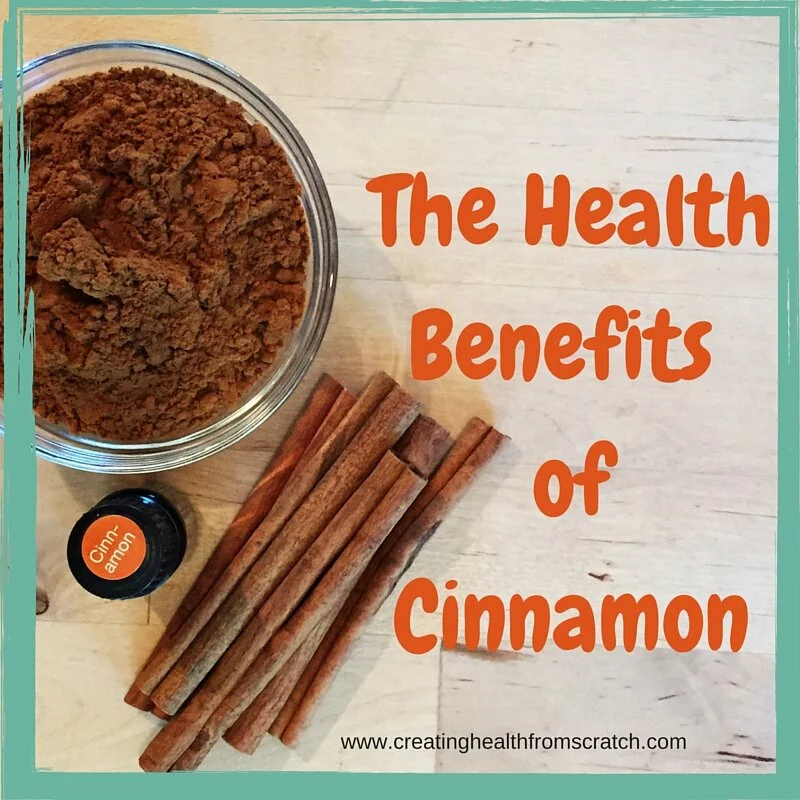Have you heard of some of the crazy amounts of health benefits of cinnamon? You’ve probably got some ground cinnamon in your cupboard because you think it’s tasty in food and drinks (I know I do!). But cinnamon is more than an aromatic, spicy flavoring to add to drinks and baked goods. It’s actually really good for you.
There are as many as 100 varieties of cinnamon. Most of the store varieties we’re all used to are actually cassia, which is made from cassia bark, not cinnamon. True cinnamon is made from Ceylon, which is much more expensive than cassia and why it’s not as widely known in the US. (Thankfully, however, cassia has many of the same health benefits, but more on that later.)
Why is cinnamon so good for us?
First, it contains a substance called cinnamaldehyde. This compound is the oily part of cinnamon and is known to have the most health benefits. Cinnamon also contains polyphenols which are super powerful antioxidants that protect against free radicals. Those same antioxidants help reduce inflammation. Lowering inflammation also lowers the risk of disease.
Cinnamon is good for the heart. It reduces bad cholesterol, increases good cholesterol, reduces risk of heart disease and reduces blood pressure. It’s also been found improve fasting blood glucose and cholesterol levels in diabetics with type 2 diabetes. It’s known to help heal skin issues (rashes and such) and ulcers.
Cinnamon might also have positive effects on folks with neurodegenerative diseases like Alzheimer’s disease and Parkinson’s disease. Two compounds found in cinnamon seem to inhibit the buildup of a protein in the brain that appears with Alzheimer’s disease and helps normalize neurotransmitter levels in mice with Parkinson’s disease.
And this is just a partial list!
How much cinnamon do you need?
It seems pretty much anyone could benefit from regular cinnamon in their diet. But, how much cinnamon do you need for these great results? Some studies suggest as little as 120 milligrams per day of cinnamon; others say 1-6 grams. (1 teaspoon is 3 grams).
What kind of cinnamon should you use?
All varieties of cinnamon contain healthy properties but some varieties are better than others for your health. Cassia, which is the common ‘cinnamon’ spice most have in their kitchen cupboard, contains high amounts of coumarin which is thought to be harmful in large doses. Yet, smaller doses of cassia still seem beneficial and contain many of the same health benefits as real (or Ceylon) cinnamon.
However, if you want an even better cinnamon, choose cinnamon oil over ground cinnamon. One reason the oil wins out over ground cinnamon is that the oil has a higher potency. It also contains some beneficial compounds not found in the powered variety of cinnamon. Another benefit to the oil over the ground spice is that it helps dilate blood vessels which help increase blood flow and lower inflammation.
Additional health benefits of cinnamon oil:
- Can help with weight loss because it balances blood sugar levels (thus helping with sugar cravings) as well as helping slow the rate of glucose in the blood when you add cinnamon to food.
- Can be used as a headache remedy.
- Can help fight sore throats, clear nasal passages and prevent mucus buildup.
- Can help heal mouth sores, toothaches and colds.
- Can boost immunity.
- Can increase circulation.
How do you use cinnamon essential oil?
There are basically three ways to add get the most of the health benefits of cinnamon oil:
- Aromatically (through smelling the oils in the air, inhaling them, putting them in a diffuser, spraying them into the air, etc.)
- Topically (rubbing it on your body—cinnamon is a hot oil, however, so make sure to dilute it with a carrier oil like fractionated coconut oil before applying it to your skin.)
- Internally* (add to water, smoothies, other food but be careful not to heat it very high as hot temperatures kill the therapeutic benefits of the oil.) Here’s a tasty recipe—candied almonds where you can use cinnamon oil.
* (ONLY ingest oils you know to be from a reputable company. The FDA recognizes cinnamon oil as safe, but not all brands are pure enough to swallow).
Precautions:
While cinnamon oil is considered safe, there is always a chance that someone sensitive will react to it. It’s always best with ANY OIL to test a small patch of skin with the oil diluted in a carrier oil before using it widely on your skin.
Also, make sure you have therapeutic grade oil if you’re going to ingest it. Not all essential oils are created equally and some contain toxic additives.
Never use an essential oil in place of medication and always talk to your doctor first before trying something new.
We all can win with the benefits of cinnamon. But caution and wisdom go a long way in making any essential oil protocol a good one for you. Be wise and proceed cautiously.

